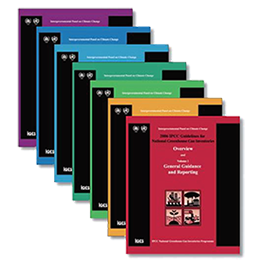GHGMI is proud to launch the only comprehensive and instructionally rich courses to break down the IPCC Guidelines for Greenhouse Gas Inventories into something that learners can more easily digest. These guidelines provide the technical basis for every type of GHG reporting. Our courses are designed to equip learners with the knowledge to succeed in reporting under the Paris Agreement.
What are the IPCC Guidelines?
The Intergovernmental Panel on Climate Change (IPCC) is the premier organization developing methods to estimate GHG emissions. Today, the 2006 IPCC Guidelines (and 2013 Wetlands supplement) contain the latest, scientifically robust and internationally accepted methods for estimating GHG inventories.
The IPCC Guidelines outline the preeminent methods for estimating seven GHGs (CO2, CH4, N2O, HFCs, PFCs, SF6 and NF3) across all sectors of the economy: energy (including transport), industrial sources, agriculture, land use change and forestry, and waste. These methods are spread across thousands of pages of documentation, written in dense, technical language.
Our Curriculum

“Powerful training for UNFCCC and future NDC reporting.”
– IPCC Guidelines Course-Series Instructor
GHGMI’s IPCC Guidelines courses are a dynamic and resource-efficient means for ministry staff to develop the prerequisite knowledge for reporting under the UNFCCC and Paris Agreement.
To learn more about each individual course, follow these links:
- 501 IPCC: Introduction and Cross-Cutting Issues (pre-requisite)
Flexibility: Available online, these courses are accessible from anywhere in the world 24/7, and are applicable to a broad range of GHG MRV reporting levels, including national, sub-national, program, entity and product levels. Our courses are designed as effective teaching tools for individual learners or as part of a larger capacity-building engagement.
Evidence-based: Our courses apply high-quality, pedagogy-rich instruction to actively teach learners this technically rigorous material. Lessons include visual graphics, sequential steps, and intuitive curriculum – making it easier for participants to learn. Each course also contains examples and interactive exercises using case studies from GHG inventories and software tools.
Learner-driven: Our system for learner interaction creates a virtual university for carbon accounting experts. These courses are written in a modular fashion, so that learners with a specific sector interest can focus on that material specifically.
Policy relevant/politically essential: As the foundational technical guidance on GHG MRV, the IPCC guidelines are the basis for NDCs, NAMAs, BURs, REDD+ and all forms of GHG reporting.
Capacity Building
The deployment and translation of the IPCC courses are two of the fast-start, scalable capacity building activities recommended in the activities annex of the Coalition for Paris Agreement Capacity Building.
For Project Managers: This series is a cost-effective “out-of-the-box” solution for institutions and organizations to use for MRV training. Going beyond discrete initiatives will help build sustained, long-term capacity. Innovative capacity building approaches allow the international community to more effectively tackle climate change. Hybrid learning that combines rigorous e-learning modules with in-person workshops is a highly effective capacity building approach, supported by pedagogical research. Contact us to discuss how this package can strengthen your trainings.
For Grantmakers: Our IPCC courses are a scalable and resource efficient means of capacity building. A scholarship fund for our IPCC courses can provide technical skills to underrepresented groups in the greenhouse gas MRV space. This support is particularly important for individuals from Least Developed Countries. Interested grantmakers and social entrepreneurs should contact us.

